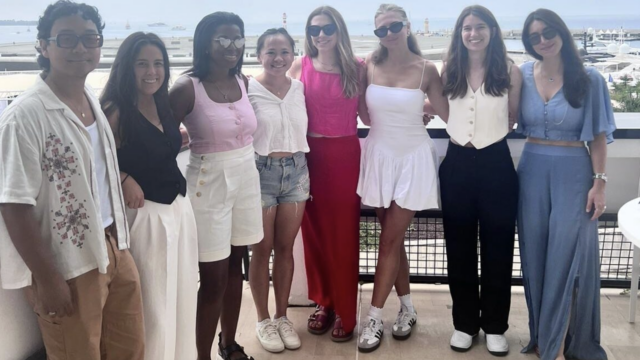The Real Reason We Go to Cannes
Never miss a beat: Subscribe to ADWEEK for exclusive Cannes Lions coverage.
For the first time in my 14 years in a row attending Cannes Lions, I spent most of the first half of the festival in the bowels of the Martinez, sitting in conference rooms, some without any windows. But it was pure joy because we had the good fortune of having to prepare for Titanium, Glass and Innovation Lions presentations. The involvement, care and focus this required made it one of the highlights of my week. Ideas shape differently, relationships and bonding between clients and agency get stronger and campaigns suddenly have a second life. It was great. All of us, together, focused on the work.
When I finally abandoned those beige-carpeted rooms, I found a different picture. Here are my thoughts on the 2024 Cannes Lions.
Calendar obligations took over
We were busy this year. No one seemed to have time for anything as if an evil AI update had taken over our calendars to steer us away from the most important thing: seeing and talking about the creative work.
This is our own doing. As the festival has grown to include more activations, more marketers, tech platforms, media giants and social media creators, it can’t force us to go downstairs in the Palais and walk around to see the work. We have to impose it on ourselves, against our crazy ambitions to meet every possible client, shine in three different panels at the same time and give free hugs to everyone.
And it is a must. Going to the Palais and experiencing people’s reactions to the work in real life reminds us of the impact of our creativity and our efforts. Observing our clients’ excitement (or plain jealousy) over great ideas is the validation we need to keep pushing. Missing that because we are running from meeting to meeting is a shame.
So, first takeaway: We need to make more room to collectively experience the amazing work while we are here.
The only other moments to do so are the Galas. McCann Worldgroup had the collective experience to see the Golds and Grand Prix in the Award Galas, introduced by the booming voice of media personality Juan Señor, the Lions’ resident emcee.
Related Video
We missed laughing
Second takeaway: Humor is back in all forms from quirky to weird to dark. Four of the biggest winners (Grand Prix) were truly funny campaigns: “The Last Barf Bag” for Dramamine; Specsavers’ “The Misheard Version” with Rick Astley, CeraVe’s “Michael Cerave” and Weber Shandwick’s “Edible Mascot” campaign for Pop Tarts. Also, the adorable “Marina Prieto,” without being strictly humorous, combines a Spanish little town sensibility with social media ambitions.
Those winners show that comedy and a light-hearted tone of voice can be transformative for a brand. Specsavers has a history of great comedy, but they were able to channel that into a new demographic for those with hearing loss. CeraVe, not in a category that typically stands out during the Super Bowl, nevertheless became the talk of the (advertising) game. Kellanova’s Pop-Tarts reached an entirely new audience by injecting dark humor to toaster pastries and giving the world something truly meme-able.
And that’s just the funny stuff. Other big winners, like what we did for Mastercard with “Room for Everyone” and Xbox’s “Everyday Tactician” as well as W+K’s Titanium Grand Prix winner, the Doordash Super Bowl campaign that averted viewers’ attention away from the game itself and onto all of the ads, were ideas that inspired an array of emotions. Empathy, triumph, even greed!
In the end, these executions make a point that you can extend to the festival: When we laugh, when our barriers are brought down by an unexpected twist or a surprising human connection, we are more able to feel.
This is the exact reason we come to Cannes: we want to feel, in real life, what it’s like to belong to this industry, to be on the winning side and celebrate, to be on the not-winning side and recharge ourselves with envy as the fuel, to be amazed about what people who do the same job as us are capable of achieving and question ourselves.
Feeling is what separates us from, yes, machines. At least for now.
So, (final takeaway) it is on us to keep coming here. Let’s continue our day-to-day jobs to connect with those emotions through the only thing that justifies the existence of Cannes or any other festival: The work we love.
https://www.adweek.com/agencies/the-real-reason-we-go-to-cannes/
